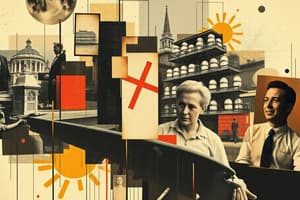Podcast
Questions and Answers
Which type of change agent is primarily responsible for initiating transformational change at the top level of an organization?
Which type of change agent is primarily responsible for initiating transformational change at the top level of an organization?
- Leadership Models (correct)
- Management Models
- Team Models
- Consultancy Models
What role do middle-level managers play in the context of change agency?
What role do middle-level managers play in the context of change agency?
- They provide external consultancy.
- They execute strategic plans without support.
- They initiate organizational transformations.
- They adapt and support strategic change. (correct)
Which model describes change agents as teams including a mix of managers, specialists, and employees?
Which model describes change agents as teams including a mix of managers, specialists, and employees?
- Consultancy Models
- Team Models (correct)
- Management Models
- Leadership Models
What distinguishes Consultancy Models from the other models of agency?
What distinguishes Consultancy Models from the other models of agency?
Change agents who operate at the strategic, operational, task, or process level, providing essential skills, fall into which category?
Change agents who operate at the strategic, operational, task, or process level, providing essential skills, fall into which category?
In change agency, which model primarily enables organizational support through functional specialists?
In change agency, which model primarily enables organizational support through functional specialists?
Which model is least likely to involve direct leadership roles in facilitating change?
Which model is least likely to involve direct leadership roles in facilitating change?
What is a common characteristic of change agents across all models?
What is a common characteristic of change agents across all models?
What is the primary role of a change agent within a team?
What is the primary role of a change agent within a team?
What is a key strength of Caldwell's leadership models?
What is a key strength of Caldwell's leadership models?
Which of the following types of teams focuses specifically on addressing organizational change?
Which of the following types of teams focuses specifically on addressing organizational change?
Which of the following represents a potential concern for management models?
Which of the following represents a potential concern for management models?
How do individuals influence team dynamics according to the content?
How do individuals influence team dynamics according to the content?
What is one strength of consultancy models?
What is one strength of consultancy models?
What essential difference exists between a project team and a change team?
What essential difference exists between a project team and a change team?
What is a potential concern regarding team models?
What is a potential concern regarding team models?
Which organizational team type primarily operates outside of traditional management hierarchies?
Which organizational team type primarily operates outside of traditional management hierarchies?
What aspect differentiates a team from a group in an organizational context?
What aspect differentiates a team from a group in an organizational context?
Which strength is attributed to both management and leadership models?
Which strength is attributed to both management and leadership models?
According to the Myers-Briggs Type Indicator, how many different types of individuals are identified based on preferences and reactions to change?
According to the Myers-Briggs Type Indicator, how many different types of individuals are identified based on preferences and reactions to change?
What is a potential drawback of using consultancy models?
What is a potential drawback of using consultancy models?
Which of the following best describes a self-managed team?
Which of the following best describes a self-managed team?
In which way can leadership models demonstrate a strong commitment from senior management?
In which way can leadership models demonstrate a strong commitment from senior management?
What is a consideration for organizations utilizing team models?
What is a consideration for organizations utilizing team models?
What is the primary role of the Expert in the consulting process?
What is the primary role of the Expert in the consulting process?
Which role in the consulting process is characterized by compliance and direction?
Which role in the consulting process is characterized by compliance and direction?
In what way does the Collaborative Role differ from the other roles in the consulting process?
In what way does the Collaborative Role differ from the other roles in the consulting process?
Why is strong contracting important in the consulting process?
Why is strong contracting important in the consulting process?
What initiative did the Quality Assurance Agency for Higher Education promote?
What initiative did the Quality Assurance Agency for Higher Education promote?
What is one possible outcome of student-led action research initiatives?
What is one possible outcome of student-led action research initiatives?
What is the primary focus of the Collaborative Role according to Block (2000)?
What is the primary focus of the Collaborative Role according to Block (2000)?
Which of the following is NOT a role that a change agent can play?
Which of the following is NOT a role that a change agent can play?
What is a key advantage of involving students as change agents?
What is a key advantage of involving students as change agents?
What challenge might arise from student engagement in the change process?
What challenge might arise from student engagement in the change process?
Which of the following is a method for ensuring equitable student engagement?
Which of the following is a method for ensuring equitable student engagement?
Which factor is crucial for effective communication among students in the change process?
Which factor is crucial for effective communication among students in the change process?
What should be considered to determine the transparency of a student engagement process?
What should be considered to determine the transparency of a student engagement process?
What is a potential disadvantage of the 'student as change agent' model?
What is a potential disadvantage of the 'student as change agent' model?
What critical role do leaders play in the change process?
What critical role do leaders play in the change process?
What enhances the likelihood of successful change according to student perspectives?
What enhances the likelihood of successful change according to student perspectives?
Flashcards
Team vs. Group
Team vs. Group
Teams have a shared goal and coordinated activity, while groups might not have a specific common purpose.
Change Agent Role
Change Agent Role
A change agent guides and influences teams during organizational change.
Team Dynamics
Team Dynamics
How individuals interact and influence each other within a team, impacting its effectiveness.
Project Team
Project Team
Signup and view all the flashcards
Management Team
Management Team
Signup and view all the flashcards
Change Team
Change Team
Signup and view all the flashcards
Individual Change Preferences
Individual Change Preferences
Signup and view all the flashcards
Organizational Team Types
Organizational Team Types
Signup and view all the flashcards
Leadership Models (Change Agents)
Leadership Models (Change Agents)
Signup and view all the flashcards
Management Models (Change Agents)
Management Models (Change Agents)
Signup and view all the flashcards
Consultancy Models (Change Agents)
Consultancy Models (Change Agents)
Signup and view all the flashcards
Team Models (Change Agents)
Team Models (Change Agents)
Signup and view all the flashcards
Change Agent Definition
Change Agent Definition
Signup and view all the flashcards
Leadership Models Example
Leadership Models Example
Signup and view all the flashcards
Management Models Example
Management Models Example
Signup and view all the flashcards
Team Models Example
Team Models Example
Signup and view all the flashcards
Consulting Process Stages
Consulting Process Stages
Signup and view all the flashcards
Expert Role (Change Agent)
Expert Role (Change Agent)
Signup and view all the flashcards
Extra Pair of Hands Role (Change Agent)
Extra Pair of Hands Role (Change Agent)
Signup and view all the flashcards
Collaborative Role (Change Agent)
Collaborative Role (Change Agent)
Signup and view all the flashcards
Student as Change Agent
Student as Change Agent
Signup and view all the flashcards
Active Engagement (Students)
Active Engagement (Students)
Signup and view all the flashcards
Action Research (Students)
Action Research (Students)
Signup and view all the flashcards
Caldwell's Leadership Models
Caldwell's Leadership Models
Signup and view all the flashcards
Leadership Model Concerns
Leadership Model Concerns
Signup and view all the flashcards
Management Models
Management Models
Signup and view all the flashcards
Management Model Concerns
Management Model Concerns
Signup and view all the flashcards
Consultancy Models
Consultancy Models
Signup and view all the flashcards
Consultancy Model Concerns
Consultancy Model Concerns
Signup and view all the flashcards
Team Models
Team Models
Signup and view all the flashcards
Team Model Concerns
Team Model Concerns
Signup and view all the flashcards
Change Agent Theories Differences
Change Agent Theories Differences
Signup and view all the flashcards
Effective Change Management Skills
Effective Change Management Skills
Signup and view all the flashcards
Change Agent Leadership Attributes
Change Agent Leadership Attributes
Signup and view all the flashcards
Best Leadership Style for Change
Best Leadership Style for Change
Signup and view all the flashcards
Student Engagement Effectiveness
Student Engagement Effectiveness
Signup and view all the flashcards
Student Selection for Change Roles
Student Selection for Change Roles
Signup and view all the flashcards
Study Notes
Team Change and the Change Agent
- The presentation is about teams, change, and the role of change agents.
- Key learning objectives include differentiating teams from groups, understanding individual preferences regarding change, appreciating the diverse roles within a team, and recognizing the change agent's part in the change process.
- Individuals, groups, teams, and management have different perspectives, preferences, and roles within an organization.
- Improving team effectiveness can lead to more effective change management.
- Individuals affect team dynamics.
- A video titled "Who Moved My Cheese" by Spencer Johnson is recommended for discussion. (YouTube link included).
- Discussion points regarding a canteen payment system and team structures include a project team made to change the canteen system, the roles in the team, and the difference between a work team and a management team. Questions about potential issues for the project team and the differences in focus on policy versus employee reaction are raised.
- Different types of organizational teams are highlighted, including: self-managed, parallel, matrix, virtual, networked, management, project, and change teams.
- Individual preferences and roles within a team affect team dynamics.
- Myers-Briggs Type Indicator (MBTI) is referenced, suggesting four personality types with varying reactions to change. Individuals can influence or be influenced by colleagues' personalities.
- Belbin's team roles are also relevant for considering team member interactions.
- Caldwell's models of change agency are examined, including leadership, management, consultancy, and team models. Strengths and concerns of these approaches are discussed.
- Models of agency are defined, detailing leadership, management, consultancy, and team approaches in change management. These models examine leaders, managers, external/internal consultants and teams, as the change agents, from different levels, functions and roles.
- Key strengths and potential concerns of each approach are outlined (Leadership model - clear sponsorship, Management model - translating strategic vision, Consultancy model - objective expertise, Team model - diverse perspectives).
- There is a suggested process for consultants and a three-pronged expert, extra pair of hands and collaborative roles.
- A university-led initiative for students' engagement in the change process is mentioned, alongside specific articles for discussion on the topic (included).
- Questions for review and discussion are presented about student roles as change agents.
- Considerations for fair, equal opportunity, and representative participation are addressed, along with potential hidden agendas and alternatives.
- "Peer pressure," "communication," and student input/understanding are key, as well as the time needed to implement change and recognize the rewards.
- A suggested activity is to research the role of leaders during the change process. Detailed questions are provided.
- Recommended further reading is included (Forsyth, 2010).
Studying That Suits You
Use AI to generate personalized quizzes and flashcards to suit your learning preferences.




